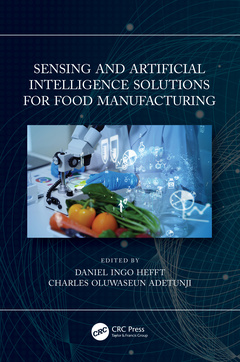Sensing and Artificial Intelligence Solutions for Food Manufacturing
Coordonnateurs : Hefft Daniel, Adetunji Charles Oluwaseun

This book gives readers a practical introduction into machine learning and sensing techniques, their design and ultimately specific applications that could improve food production. It shows how these sensing and computing systems are suitable for process implementation in food factories.
This book starts by giving the reader an overview of the historic structures of food manufacturing standards and how they defined today?s manufacturing. It is followed by a topical introduction for professionals in the food industries in topics such as AI, machine learning, and neural networks. It also includes an explanation of the different sensor systems and their basic principles. It shows how these sensing and computing systems are suitable for process implementation in food factories and what types of sensing systems have already been proven to deliver benefit to the food manufacturing industries. The authors also discuss issues around food safety, labelling, and traceability and how sensing and AI can help to resolve issues. They also use case studies and specific examples that can show the benefit of such technologies compared to current approaches.
This book is a practical introduction and handbook for students, food engineers, technologists and process engineers on the benefits and challenges around modern manufacturing systems following Industry 4.0 approaches.
0. front matter. 1. Overview of Sensors and Sensing Techniques in Food Processing. 2. Sensing and Artificial Intelligence for Food Packaging. 3. Optical Methods - Advanced Image Recognition and Feature Extraction Solutions for Food Manufacturing. 4. Artificial Intelligent and Automation for Precision Pest Management. 5. Role of Biosensor in Inspection of Food and Agricultural Products: Current Advances. 6. Packaging of Animal-Based Food Products -The Need for Intelligent Freshness Sensors. 7. Application of Gas/Biosensors for Effective Determination of Contaminants in the Environment and Food Products as Well as Their Role Detection of Toxic Pesticides. 8. Artificial Intelligence in Food Fraud and Traceability. 9. Relevance of Biosensor in the Detection of Contaminants and Pollutants in Food, Agricultural And Environmental Sector. 10. Artificial Intelligence and Its Role in Food Industry. 11. Recent Advances in the Characterization and Application Graphene in Food Industry. 12. Artificial Intelligence in Food Packaging Industry.
Date de parution : 03-2023
15.6x23.4 cm
Disponible chez l'éditeur (délai d'approvisionnement : 14 jours).
Prix indicatif 111,58 €
Ajouter au panierThèmes de Sensing and Artificial Intelligence Solutions for Food... :
Mots-clés :
AI; Food manufacturing; Sensor; Industry 4.0; Process design; food engineering; Food fraud and traceability; Emerging technologies food; Hygienic design; Data harvesting; Adaptive Neuro Fuzzy Inference System; MLP Neural Network; Food Packaging; Local Binary Pattern; Raman Spectroscopy; Foodborne Illnesses; FFD; Foodborne Diseases; Go; Graphite Oxide; RGB Model; RFID Tag; Renormalized Difference Vegetation Index; Porcine DNA; Humidity Sensors; Deep Convolutional Neural Network; RFID Tag System; Computer Vision Systems; Denso Wave; Moisture Content; EVI Index; Iron Oxide Nanocomposite; Sugar Beets Cultivars; GNS; Automated Image Recognition



